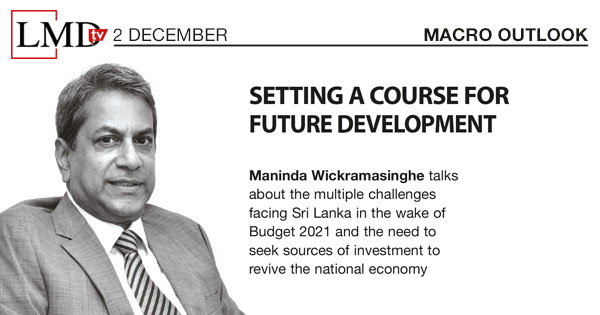
“When Moody’s announced the two notch downgrade of Sri Lanka in October, there was a view that it was being preemptive,” stated the CEO and Country Head of Fitch Ratings Lanka Maninda Wickramasinghe, as he commented on rating agencies’ view of Budget 2021.
He elaborated: “With a new government and president in place, Fitch Ratings was looking to see the direction of the budget as ratings are not about the present but the future. The post-budget announcement review led to a downgrade to ‘CCC,’ which means that Fitch believes there is a heightened risk and has specified this is in the debt dynamics area.”
“A key element is how we’re planning to pay our external debt, which is critical as accessing sovereign bond markets is more difficult when ratings are lower,” Wickramasinghe pointed out.
However, he also noted that the budget contained proposals with regard to investments and incentives for new businesses – particularly SMEs.
Discussing his take on the allocation of Rs. 40 billion for various infrastructure development projects given the need to spur growth in the wake of a potentially ballooning fiscal deficit, Wickramasinghe stressed the importance of investing in any economy: “On their own, investment and allocation are not bad but how do we go about it?”
Among the questions to be considered are whether investments should be undertaken by the government or if private capital is needed, and how much should be pursued through bilateral or joint ventures.
“Being an economy where our resources are limited – and foreign direct investments are needed because the economy and domestic markets do not generate sufficient investments – we must tap into countries with higher savings,” Wickramasinghe stated.
And he continued: “Against this backdrop, we must be smart about how investment is attracted in joint ventures so that we have access to capital and possibly even technology. Once this is in operation, revenue streams will be much better and job opportunities will increase.” An example he cited is the Port City (Colombo International Financial City a.k.a. CIFC), in which the government would not have to invest any capital with the developer undertaking the entire investment.
Emphasising that this is a classic example of how investments can be secured, he noted: “We must observe the laws of the region as a special economic zone and how it generates employment, as well as current and capital account transactions eventually.”
While Budget 2021 includes incentives for exporters, there were fewer positives for importers, which could impact the country’s prospects of becoming a hub.
However, Wickramasinghe acknowledged that Sri Lanka must address its trade imbalance as import growth has outpaced exports, which could serve as an indicator that the nation will be unable to meet its external obligations. Therefore, he believes we must consider value addition rather than merely input.
When it comes to the future of state owned enterprises, he highlighted the need for reforms.
An approach he suggested involves assessing which entities could be listed on the Colombo Stock Exchange (CSE). This could also ensure that they adhere to strict checks and balances to remain listed.
In his concluding remarks, Wickramasinghe highlighted steps that the country should take to improve its rating: “We are no longer a developing country but an emerging economy – so we lack access to grants and cheap long-term credit. Given this, it would be timely for the Ministry of Finance, Treasury and Central Bank of Sri Lanka – as managers of the economy – to form a joint group to prepare the country to access credit markets.”
“Sri Lanka scores well in human development indices but also faces various macro issues,” he remarked, stressing that “it’s time to look at resourcing and take a bolder view of what needs to be done. This also means there is a need for agencies to collaborate and plan for the next few years.”



